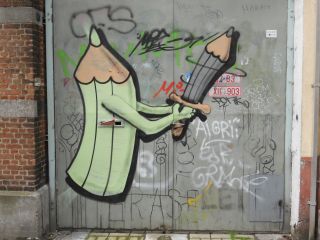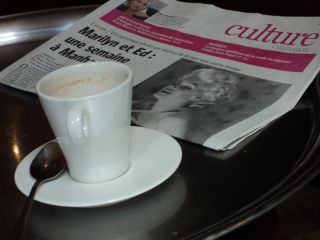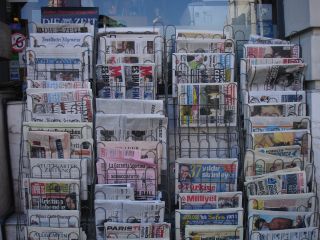|
BRUSSELS WALKS :: ABOUT :: CONTACT
MY SECRET LIFE

My secret life: from our own correspondent

How journalists report the news from Brussels
You find them in the Old Hack drinking De Koninck or Leffe under large black-and-white photographs of British newsrooms in the 1930s. For several decades, this small bar near the Berlaymont building has been a favourite Brussels haunt for the foreign correspondents that cover the European Union on behalf of newspapers published in Prague, Beijing, New York and London.
The Old Hack was opened by a British journalist and is now run by a Dutch couple. It is well placed for correspondents who want to organise an informal meeting with one the European Commission press officers. “Do you fancy a quick one in the Old Hack?” is the perfect starting point for a confidential briefing on emerging EU policies that could eventually have an impact on the lives of some 500 million EU citizens.
The Old Hack occupies one of the last surviving 19th-century houses in a neighbourhood that over the past 60 years has become the heart (if not the soul) of the European Union. Sitting at one of the window tables tapping out a story on their laptop, the journalist has a clear view of the landmark 1960s glass and steel building built by the Belgian government as the headquarters of the European Commission.
On leaving the Old Hack, the attentive journalist can follow progress on the controversial new Council building that will one day replace the bunker-like Justus Lipsius building. A ten-minute walk through building sites and across busy roads gets the correspondent to the European Parliament, where 736 MEPs gather to debate EU legislation.
The journalists work for different audiences, in different time zones, so deadlines vary enormously. A New York Times journalist is six hours ahead of his editors, making it easy to meet a late afternoon newsroom deadline, whereas a Japanese reporter has to build his day around the fact that the Tokyo office is already seven hours into the working day when he turns on his computer.
When the Old Hack opened, the Brussels press corps was a modest collection of journalists who reported on the directives that came out of the European Commission. As the European Union grew larger and more important, and the stories became more gripping, the number of journalists increased dramatically.
The biggest surge came around the time of Europe’s “Big Bang” enlargement in 2004, when the EU grew from 15 to 25 members. Journalists suddenly flooded into Brussels from Eastern European countries, dispatched to write stories for readers back home who were keen to know about the new political union they had joined. Others arrived from India and China to find out what Europe was planning that could affect their economies.
In those heady days, many people argued that the EU had become a major political and economic force on the world stage. It had the power to fine a mighty corporation like Microsoft or force Japanese car- makers to respect emission rules laid down in Brussels. The EU also had its own currency introduced in 2002 which challenged the dollar and exercised a form of soft diplomacy that offered an alternative to the aggressive US foreign policy of the Bush administration.
Around 2006, the Brussels city authorities started to put out the boast that Brussels had the world’s second-largest foreign press corps, after Washington. The exact figures are unknown, since journalists are not obliged to register with the authorities. The only figures available come from the department which issues annual press passes for the EU institutions, which accredited 1,300 journalists in 2005, not far short of the 1,500 in Washington.
It became fashionable at the time to talk of Brussels as Europe’s Washington. People toyed with the concept of “Brussels DC” and even spoke about the “Brussels beltway”. As the city became flooded with lobbyists – another group hard to count but estimated to number some 15,000 – it was widely agreed Brussels was an exciting place to work as a journalist. But that was before the newspaper industry was hit by the biggest crisis in its history.

Media in crisis
The global financial crisis that broke in the autumn of 2008 hit a newspaper industry that was already battling against the rise of digital information. The internet was an infinite free resource, overflowing with news sites, bloggers and Twitter micro news. How could the old dinosaurs of print hope to compete with these smart young people on the web?
Confronted with a dramatic fall in reader numbers, as well as a decline in advertising income, many newspaper owners panicked in about 2009. They decided that the only solution was to cut staff as well as content. It was almost universally decided to focus on local news and reduce the number of foreign correspondents.
As a result, the Brussels press corps has declined dramatically in the past few years, according to the International Press Association (IPA), which represents foreign journalists in the city. But when you examine the official figures for accredited journalists, the situation does not seem too serious. The number of journalists issued with an EU press pass rose from 878 in 2002 to 1,031 in 2001, and has now declined to 935 in 2012. So there has been a drop, but hardly a newsroom bloodbath, as some have suggested..
The German press dominates Brussels these days, with 123 accredited journalists working in the city, followed by Britain with 98 and Italy and Spain each with 63. Somewhat surprisingly, France comes in fifth place, with its 56 accredited journalists. According to Libération’s Brussels correspondent Jean Quatremer, most French newspapers have drastically cut their Brussels staff since 2008, with Le Monde down from five to two journalists, and Le Figaro’s Brussels desk now manned by one person in place of two. Worse still, most Central and East European newspapers have simply closed down their Brussels offices, says Quatremer.
In his blog, the Libération correspondent blames the Belgian authorities for the fall in numbers. He argues that Belgium’s high taxes and social contributions have forced newspapers to close their Brussels offices while keeping correspondents based in cities like London and Washington.
But Quatremer also blames the European Commission for the way it deals with journalists. Foreign correspondents traditionally gained the information they needed at weekly briefings in the Commission’s press room, where they could ask difficult questions. But the Commission’s press releases now go online instantly (through a service called RAPID), so a journalist sitting at a desk in Dublin or Prague can pick up the press release at exactly the same moment as someone sitting in the Brussels press room. This makes it much easier for a newspaper to cut its Brussels staff, even if it means the stories it publishes are simply based on a press release.
There is possibly one more reason why the Brussels press corps is shrinking fast – Brussels has become dull for a journalist. “The malaise gripping Brussels has its echo in a growing sense that the EU project is just not where the action is,” the Economist’s Brussels correspondent wrote recently.
Looking at the figures for the BBC, it’s clear that the action is on the side of the Atlantic. The British corporation employs 55 people in the United States, compared to 15 in Brussels and a further ten in other European locations. So the US (population 307 million) gets twice as many foreign correspondents as Europe (500 million).
While the number of journalists may have fallen, the number of media outlets has grown steadily over the years, from 574 in 2002 to 642 in 2012. The newspapers and TV stations might have fewer staff, but they are still watching Brussels closely.

Beyond the bubble
The Belgian authorities can hardly be blamed for everything. They have been generous to journalists over the past 10 years. In 2001, during the Belgian presidency of the European Council, the Verhofstadt government opened a smart new press centre in the Residence Palace. Facing the Berlaymont, the former 1920s apartment complex offered the press an impressive Art Deco lobby, an elegant restaurant and several rooms for hosting press conferences.
Ten years on, the government of Brussels Region went one step further and helped to fund a new Brussels Europe Press Club at 95 Froissardstraat, opposite the Justus Lipsius building where Herman van Rompuy has his office. The Region, which worked closely with the International Press Association to set up the club, hopes that it can persuade journalists to write stories on Brussels that will make it seem less boring.
But most foreign journalists based in Brussels have little inclination to seek out stories outside the “European bubble”. “Journalists don’t move much beyond Schuman [the roundabout at the heart of the European Quarter],” one long-established journalist told me. Over the years, the international press has only taken an interest in Belgium when the story is negative. The Dutroux child murders in 1996 were heavily reported in international newspapers under headlines such as “Something is rotten in the state of Belgium.” The recent failure to create a coalition government has also engaged the international press. Apart from those stories, Belgium rarely appears in the international pages of foreign newspapers. “We try to propose stories, but there isn’t much interest in Belgian news back home,” one journalist explained to me.
When journalists do report on Belgium, they often rely on Le Soir and La Libre Belgique for their background information, ignoring reports in De Standaard and De Morgen. The reason is simple. Journalists often have a basic command of French, though almost none (apart from those from the Netherlands) can speak any Dutch.
The Flemish government has been aware of the problem for many years, but it was finally pushed into action in 2007 when a francophone newspaper with an anti-Flemish bias started to appear in the in-boxes of EU officials. In October 2007, the Flemish foreign affairs and media minister Geert Bourgeois launched a new English-language newspaper called Flanders Today with the aim of providing objective news on Flanders – not a Pravda, insisted Bourgeois.
One of its goals was to reach the international journalists who work in Brussels, but knew very little about what went on beyond the “Brussels beltway”. The Flemish government later launched a daily online press review in English and French which posted stories selected from the quality Flemish press on the Flanders Today website.
I was involved in the launch of the newspaper and served as editor for more than three years. During that time, the newspaper occasionally came into conflict with the government over content. The hardest article to bring to press involved the village of Doel. Here was a story that involved an old Flemish town that was due to be demolished because the port of Antwerp needed to expand. It was a situation that could happen in any modern industrial country, involving a difficult choice between heritage and commerce, but the government tried to stop the story being published and, when that failed, refused to cooperate with the journalist.

What does the future hold?
On 21 March 2011, a brief notice appeared in the Belgisch Staatsblad announcing that the Librairie de Rome had been declared bankrupt. This marked the end of the best-stocked international newsagent in Brussels, an institution that dated back to 1934. It was clear proof that the newspaper crisis was hitting Belgium hard.
Some editors go so far as to argue that the newspaper of the future will be read on screen rather than on paper. This will have profound cultural and economic consequences across the world. It will mean printing works will close down, newsagents will disappear from the streets and the old routine of press deadlines will be a thing of memory.
Not everyone, however, believes that newspapers are finished. In 2006, the Belgian Persgroep opened a brand-new printing works near Lokeren in East Flanders, the Eco Print Center (EPC). In a beautiful light-filled building, De Morgen, Het Laatste Nieuws and other Flemish newspapers are printed using the latest technology of waterless offset printing.
I visited the EPC on 15 June 2011 to watch the preview edition of the European Daily come off the presses. The newspaper, launched by two young Swedes, aims to provide a European perspective on global news. Some 40,000 copies were printed in Lokeren and distributed the following day in Brussels, London, Paris and Berlin.
The aim of the pilot edition, edited in a borrowed apartment in Brussels, was to find out whether there was a critical mass of enthusiasm among readers, advertisers and investors for a European daily newspaper. “The feedback has been quite overwhelming,” said Christofer Berg, one of the co-founders.
The European Daily shows that the idea of a newspaper still remains alive, even in a generation that has grown up with Facebook and iPads. “Reading the newspaper together with the morning coffee might seem a trivial daily routine,” says Berg, “but it is one of the pillars of a truly vibrant and democratic society.”
“Where do you plan to base the newspaper?” I asked Berg, expecting him to reply Brussels, the capital of Europe.
“Amsterdam,” he said without a moment’s hesitation.
“Not Brussels?”
“Brussels is too bureaucratic, too close to the institutions.”
I was initially shocked, but it now makes perfect sense. Brussels has become a stale place to work as a journalist. It doesn’t have the excitement of Washington or London.
The European Daily has not yet launched as a newspaper. It may never do so. But it at least proved that there is demand for news from a European perspective.
The current crisis in the EU has shown that the internal politics of Greece is something that can no longer be ignored by the rest of Europe. A property bubble in Spain will have repercussions in Finland. Stories from Europe no longer belong in the foreign section; they are domestic issues that affect everyone.
The correspondent based in Brussels is well placed to write about European events as domestic news. Some European papers appear to have lost sight of the importance of Brussels and have cut their Brussels staff. But the number of Chinese journalists based in Brussels has risen steadily in recent years, from 14 in 2002 to 24 in 2010.
The Chinese reporters are based in a building in the heart of the European Quarter, not far from the Berlaymont building. It may be that a reader in Beijing is now better informed about Brussels than a reader in Birmingham. That would be bad news for Europe.
The writer was formerly editor-in-chief of The Bulletin and Flanders Today. He edited the preview edition of European Daily, published on 15 June 2011, and is now involved in launching a weekly newspaper for Brussels. He is a co-founder of Cafe Europa, a coffeehouse discussion group.
The above article was first published in The Low Countries 20, a yearbook on Dutch and Flemish culture
|